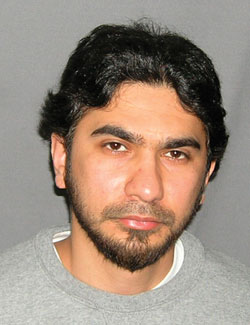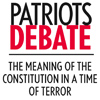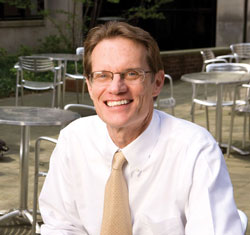Probing Questions: Experts Debate the Need to Create Exceptions to Rules on Coerced Confessions

Shahzad may be the rare case of a terrorism suspect who confesses with no coercion. AP photo / U.S. Marshals Service / file
Former FBI Special Agent Coleen Rowley didn’t exactly shout out “I told you so!” But she gloated when she scribbled it atop a blog account after officers caught and questioned the suspect in the attempted Times Square bombing.
“After so many years of waiting and warning,” Rowley told the Huffington Post in a May 5, 2010, column, “it was nonetheless gratifying to see several news accounts yesterday revealing the FBI finally relied on the ‘public safety exception’ ” to the landmark 1966 U.S. Supreme Court case Miranda v. Arizona to interview Faisal Shahzad. The exception lets officers collect potentially life-saving information from a suspect before warning him of his legal rights.
Rowley knows about investigating suspected terrorists. In August 2001, her Minneapolis office was busy probing a French citizen named Zacarias Moussaoui, who was held after his arrest on immigration charges. The FBI wanted to know why he had paid a flight school to learn how to maneuver a Boeing 747 jet.
The bureau sent more than 70 emails to FBI headquarters for permission to get a warrant to search Moussaoui’s laptop computer, but the higher-ups rebuffed them. Unbeknownst to the Minneapolis bureau, FBI agents in Phoenix had warned that operatives of the terrorist group al-Qaida had also been enrolled in flight training schools in the Southwest.
On the afternoon of Sept. 11—with the World Trade Center in ashes and the Pentagon in flames—and again the next morning, Rowley implored FBI headquarters to allow agents to interrogate Moussaoui. She cited the public safety exception, established by the high court in the 1984 case of New York v. Quarles.

Read all the articles in the Patriot Debate series:
WAR POWERS
- • Constitutional Dilemma: The Power to Declare War Is Deeply Rooted in American History by Richard Brust
- • War Powers Belong to the President by John Yoo
- • Only Congress Can Declare War by Louis Fisher
TARGETED KILLINGS
- • Uneasy Targets: How Justifying the Killing of Terrorists Has Become a Major Policy Debate by Richard Brust
- • Targeted Killing Is Lawful If Conducted in Accordance with the Rule of Law by Amos N. Guiora and Monica Hakimi
CYBERWARFARE
- • Cyberattacks: Computer Warfare Looms as Next Big Conflict in International Law by Richard Brust
- • What Is the Role of Lawyers in Cyberwarfare? by Stewart A. Baker and Charles J. Dunlap Jr.
COERCED INTERROGATIONS
- • Probing Questions: Experts Debate the Need to Create Exceptions to Rules on Coerced Confessions by Richard Brust
- • Should We Create Exceptions to Rules Regarding Coerced Interrogation of Terrorism Suspects? by Norman Abrams and Christopher Slobogin
DOMESTIC TERRORISM
- • Insider Threats: Experts Try to Balance the Constitution with Law Enforcement to Find Terrorists by Richard Brust
- • The Threat from Within: What Is the Scope of Homegrown Terrorism? by Gordon Lederman and Kate Martin
Next Topic: NATIONAL SECURITY LETTERS
“Although there was speculation for days as to whether more hijacked planes were heading our way,” Rowley wrote, the answer from Washington was no dice.
In May 2002, Rowley unleashed a 13-page screed to FBI Director Robert Mueller, admonishing the agency for stepping in the way of the terrorism investigation.
Particularly, she said, “if prevention rather than prosecution is to be our new main goal (an objective I totally agree with), we need more guidance.” She added, “We were prevented from even attempting to question Moussaoui on the day of the attacks, when, in theory, he could have possessed further information about other co-conspirators.”
Nine years later, Rowley wrote in HuffPost, the agency seemed finally to get its constitutional law correct.
Shahzad was nabbed May 3, 2010, as he tried to board a flight to Dubai. Two days earlier, Times Square street vendors told police they spotted smoke billowing out of a parked SUV. A bomb squad dislodged a homemade device of alarm clocks, wiring, gas and propane tanks, explosives and a bag of urea-based fertilizer—enough, police said, to form a fireball in the crowded theater district.
Clues led investigators to Shahzad, a naturalized U.S. citizen born in Pakistan, who had thrived here as a financial analyst before abruptly leaving the country in June 2009. He had become disillusioned with his adopted country and was drawn to Islamic radicals.
U.S. officials suspected there might be more to the bomb plot, so they invoked the public safety exception and began questioning Shahzad. He not only confessed but provided “valuable intelligence and evidence,” according to news reports.
When officers realized there was no immediate danger, they advised him of his Miranda rights. Curiously, he waived them and kept talking.
But Shahzad may be the rare case of a terrorism suspect unburdening himself of crucial information without being impelled during questioning. Hypothetically, if Shahzad had refused, bombs planted elsewhere in Manhattan could have torn holes in the city. Meanwhile, speculators can only wonder what acts might have been prevented by interviewing Moussaoui.
Many agree with Rowley that agents need more guidance, which she implored the FBI to provide. In response to her missive, the FBI released a memo in October 2010 encouraging a broad interpretation of the public safety exception, allowing agents to interrogate suspected “operational terrorists” about immediate threats without advising them of their Miranda rights.
The “magnitude and complexity” of the threat—known as exigent circumstances—justified a “significantly more extensive public safety interrogation without Miranda warnings than would be permissible in an ordinary criminal case,” the memo said.

FBI agents remove evidence from Shahzad’s house in Bridgeport, Conn. Shahzad had only recently returned to the United States after spending several months in his native country. Photo by AP Photo/Mark Lennihan.
CONSIDERING OTHER OPTIONS
Others wonder whether we need to Mirandize potential terrorists at all. “When we detain terrorism suspects,” said Sen. John McCain of Arizona after the Shahzad incident, “our top priority should be finding out what intelligence they have that could prevent future attacks and save American lives. Our priority should not be telling them they have a right to remain silent.”
Asked New York Rep. Peter King in an interview with Politico: “How much more should they get” from Shahzad? “Did they Mirandize him? I know he’s an American citizen, but still.”
And some suggest moving the suspect from the civilian court system and treating him as an unlawful enemy combatant under the Military Commissions Act.
Another idea, proposed by UCLA law professor Norman Abrams, would be adopting a limited—or “cabined”—exception during questioning to allow interrogators to use otherwise discouraged techniques to obtain confessions from suspected terrorists. The exception would give officials leeway to use those techniques on detainees to elicit information.
The guidelines would apply only in exigent circumstances with the potential for massive threats to large populations, Abrams writes in an essay for an upcoming book by the American Bar Association’s Standing Committee on Law and National Security.
Abrams rejects torture; but, he says, what’s lacking are clear rules spelling out what methods FBI agents may select. The FBI handbook, which prohibits “threats and psychological torture; … isolation, incommunicado interrogation; … trickery, ruse [and] deception,” is nevertheless too elusive, and courts will at best only consider techniques when deciding which methods are acceptable.
“FBI field agents are likely to be uncertain what confession rules will be upheld by the courts,” Abrams writes. “They are in need of clear guidance … and clearly drawn rules.”
Abrams and Vanderbilt University law professor Christopher Slobogin were invited to debate the issue of creating exceptions to rules regarding coerced interrogations in the committee’s book, Patriots Debate: Contemporary Issues in National Security Law, expected to be published this summer.
Slobogin wonders whether Abrams’ cabined exception is needed. Courts over the years have so punctured Miranda’s reach that they now permit officers a menu of interrogation techniques from which to choose.
“If the police avoid direct threats, promises that an officer is not empowered to make, or deception about the scope of one’s right to remain silent or right to counsel,” Slobogin writes in his essay for the book, then “police ruses are not coercive and should be considered constitutionally permissible under current doctrine.”
Only if interrogators want “to be able to resort to physical coercion, threats of physical harm or unauthorized promises would a cabined exception be necessary,” Slobogin adds.
As for the interplay between gathering intelligence and admitting testimony for criminal conviction, the government is free to violate Miranda all it wants if its goal is only to gain information, rather than to supply evidence, Slobogin says.
In the end, Slobogin fears a slippery slope where “pressure tactics will become routine practice not only in cases involving alleged terrorists,” but in the questioning of anyone thought to be “connected with a terrorist organization, including illegal immigrants.”
Dealing with confessions deemed coerced is one of the most vexing issues in criminal law. Courts must balance whether an often reluctant witness is telling a truthful account of a potential crime, against the possibility that investigators threatened the person to respond.
Likewise, law enforcement officers must master the intricate techniques of gaining accurate information while making sure their probing isn’t so severe that the witness chooses to misinform merely to end the interrogation. In that case, the officer also must deal with the exclusionary rule, the court’s penalty against admitting testimony from a witness who was misled or punished during questioning.
An 1897 Supreme Court case dealing with forced confessions, Bram v. United States, said that for a confession to be admissible it “must be free and voluntary.” According to the court, “it must not be extracted by any sort of threats or violence, nor obtained by any direct or implied promises, however slight.”
Courts were later instructed to evaluate the circumstances surrounding confession to determine whether there were “indicia of voluntariness.”
The court took a stronger stance in a 1959 case, Spano v. New York, when it sought to determine whether the confession was made when the “person’s will was not overborne.”
Chief Justice Earl Warren, author of the majority opinion, said that “the abhorrence of society to the use of involuntary confessions does not turn alone on their inherent untrustworthiness.”
Instead, wrote Warren, “it turns on the deep-rooted feeling that the police must obey the law while enforcing the law; that in the end life and liberty can be as much endangered from illegal methods used to convict those thought to be criminals as from the actual criminals themselves.”
The cases opened the door to Miranda, which set the high-water mark in criminal procedure. This time, the Warren court set a new standard for the coerced confession, saying that all custodial interrogations “were inherently coercive, rendering all statements—both inside and outside the police station—involuntary and thus inadmissible,” according to Joanna Wright’s 2011 Columbia Law Review article, “Mirandizing Terrorists? An Empirical Analysis of the Public Safety Exception.”
There was one way to rebut the “presumption of coercion and thus involuntariness,” she said: informing the suspect of his constitutional rights. “If the police notified the suspect of her right to remain silent, the potential that statements she made could be incriminating and her right to have an attorney present during questioning,” wrote Wright, the interrogation may proceed.
In the aftermath of Miranda, with crime rising and a more conservative political climate taking root, the Supreme Court steadily picked away at the case.
Quarles established the public safety exception. Police there were informed that a suspect had a gun; they soon encountered him in a store. After he fled, police chased and stopped him, then noticed his holster was empty. They asked where the gun was, and the suspect nodded to a trash pile. After retrieving the weapon, police then read the suspect his Miranda rights.
In the majority opinion, Justice William H. Rehnquist said the public safety threat “outweighs the need for the prophylactic rule protecting the Fifth Amendment’s privilege against self-incrimination.” Rehnquist re-envisioned the Miranda statement not as a right itself, but rather as a prophylaxis, a means to an end.
The Quarles exception, Wright said, “inoculates a large subset of statements previously vulnerable to Miranda’s exclusionary rule, admitting any statements that respond to a question reasonably perceived to be relevant to public safety.”

AP Photo/APTV, File
WATCHING THE LEGISLATIVE PROGRESSION
Sept. 11, 2001, changed everything, including the nation’s thinking about criminal procedure.
Abrams recognizes these changes, which he spelled out in a 2012 paper, Terrorism Prosecutions in Federal Court: Exceptions to Constitutional Evidence Rules and the Development of a Cabined Exception for Coerced Confessions. A longtime member of the UCLA faculty, Abrams has held several senior positions, including vice chancellor of academic personnel. He is an expert at federal criminal law and anti-terrorism law.
Abrams notes that the courts and Congress have followed each other over the years in establishing new laws to deal with terrorism. For example, in 1972 the Supreme Court turned down a request that the president have sole authority to bypass a warrant for domestic security cases. But the court allowed Congress to establish different search-and-seizure standards for domestic security.
“Half a dozen years later Congress adopted a statute that put that into effect regarding foreign terrorism,” Abrams says in a phone interview.
“If you look at this history, you see a gradual development,” he says. The judicial branch in the 1970s and recently the FBI with its 2010 public safety exception have pushed ahead the rules regarding terrorists. “So I just want to move it one step further.”

Professor Norman Abrams of UCLA
This judicial and congressional progression implies that courts and legislators may now be ready to adopt Abrams’ cabined exception for coerced confessions. The exception would apply where “governmental agents were gathering evidence not for the purpose of prosecution but rather for some other purpose”—in this case, “preventing future terrorist acts,” Abrams says in his article.
By cabined, Abrams means “encapsulated … not extending all the way up the ladder” of interrogation methods, yet allowing for a “limited, nonextreme set” of methods.
Although the methods would fall short of torture—“unlawful in all circumstances,” Abrams says—they nevertheless may involve deception and psychological pressure, techniques that might otherwise lead a court to call them involuntary and inadmissible should they be submitted for evidence.
Abrams is wary about getting caught up in a debate at this stage about what interrogation methods would be allowed. “There would have to be judicial support for it,” he says in an interview. “Once there is that kind of possibility, then the Justice Department would get involved.” Since the FBI came out with its public safety exception, “this is an indication that the FBI may come up with it.”
As for the slippery slope that Slobogin fears, Abrams counters that creating a cabined exception would prevent a confusion of court decisions over what judges would allow officers to do.
“The important point is to say terrorism cases are exceptional, and it’s fair to make an issue of what techniques are permissible,” he says.
Nevertheless, Slobogin wonders about the “extent to which trickery is necessary” to obtain a confession. According to his 2007 article “Lying and Confessing,” published in the Texas Tech Law Review, “the vast majority of confessions occur during the initial interview within a short period of time.”
An expert on criminal procedure and mental health law, Slobogin is director of Vanderbilt’s criminal justice program. He also holds an appointment as a professor in Vanderbilt medical school’s psychiatry department.
“In the typical case,” Slobogin writes in the law review, “deception plays little or no role in obtaining confessions because the suspects confess quickly.”

Professor Christopher Slobogin of Vanderbilt University
That applied in the Shahzad case, as the suspect continued to talk. It applied too in the case of Umar Farouk Abdulmutallab, the 2009 Christmas Day bomber, who confessed and was convicted of attempting to detonate plastic explosives hidden in his underwear while aboard a Northwest Airlines jet trying to land in Detroit.
Abdulmutallab initially cooperated with investigators, then—after being read his Miranda rights—stopped talking, prompting critics to question why he was read his rights. When agents agreed to bring Abdulmutallab’s family to the U.S. from Nigeria, he resumed conversing.
To Slobogin, courts are likely to accept that police reaction.
“Legally we don’t need coerced confessions because courts are already lenient when it comes to deception,” he says in a phone interview. “We already have a pretty expansive doctrine of what interrogators are allowed to do.”
And, he says, should there be any violation of a suspect’s rights under questioning, the suspect can resort to a due process claim. “The due process clause is a backup protection that prohibits the government from acting coercively whether or not Miranda warnings are given.”
As for increased rules for law enforcement agents, Slobogin insists that rules are necessary, but they shouldn’t differ from the rules courts attach to regular civilian cases.
Despite the two approaches, lawyers experienced in litigation involving suspected terrorists identify another reason terrorists seem ready to talk.
“My experience with … Islamists is they love to talk,” famed New York City defense attorney Ron Kuby told the Associated Press. “Their goal isn’t to beat the rap when they’re caught. Their goal is either to die as a martyr or commit mass murder.”
Ken Wainstein, a former U.S. attorney who headed the Justice Department’s anti-terrorism efforts, said a defendant’s cooperation is motivated by “just sheer pride in what he’s done,” according to news reports.
“So again,” Slobogin says, “we don’t need any specialized techniques.”
Write a letter to the editor, share a story tip or update, or report an error.


